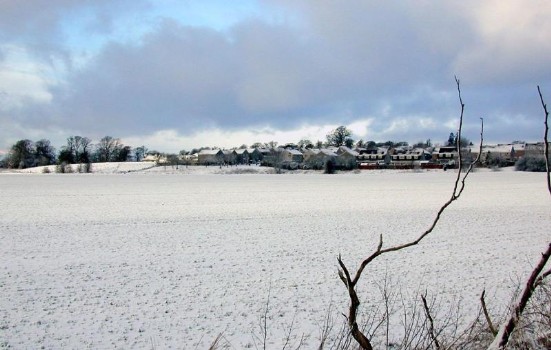

I was interested in determining the first names of the early Wightons, wondering if there had been some traditions established during those years. This is somewhat of a sensitive issue in our family. In the Meigle Wighton line, the name John appears as a first name in six of the first seven generations. Only one generation was without a John. (Somewhat of an uncanny experience, wouldn't you say?) This de-johnification of the family occurred again in the 9th generation when the name David was chosen for the author and the family became John-deficient. Dire consequences were predicted for the poor lad disadvantaged in such a disastrous manner. These curses included limited intelligence, lack of hair, and a bad sense of humour. So strong was this curse of the John that all of these afflictions became true. So, I was quite curious to see if other Wighton families were similarly populated by a preponderance of Johns.
Although limited by my inability to count beyond 20, I managed to determine that "Yes, indeed", the name John was the 'prenom de jour' for many Wighton families. But, it was a close contest with the second most favoured name James losing the contest by only a manly paunch. Since my middle name happens to be James, hopefully I can now attend family functions without having to perch awkwardly on that special stool in the corner. At least the dunce cap stops the light from shining off my head and disturbing other family members while they eat.
The 5 most popular names chosen for Wighton babies prior to 1725 are shown below:
| 1. John | 1. Margaret |
| 2. James | 2. Isobel |
| 3. Thomas | 3. Elizabeth/Elspet |
| 4. William | 4. Janet |
| 5. David | 5. Jean |
Other common names for boys were: George, Robert, Andrew, and Alexander, and for the girls - Agnes and Anna/Anne. The most unique forename that I found was Jacabina. I can just picture Jacobina's father with his fist raised in the air, his kilt flowing around his knees, and his final words ".... you" blown away by the wind as his penal ship to the colonies departed. Incidentally, I doubt that our family patterns were much different from other families at the time. I examined the first names of several families that I found on a list of apprenticeships in Edinburgh in the same time period and found exactly the same names, but in slightly different proportions.
It's hard to know when middle names came into vogue. I found few instances in the 17th and 18th centuries, but that may have been because the middle name just wasn't recorded. When middle names did start to appear, they tended to be chosen to link the child to the mother (via her maiden name) or to a grandparent. For example, our own John Baxter Wighton was named after his father John, and his mother Anne Baxter. Elizabeth Taylor Wighton was named after her paternal grandmother Elizabeth Taylor. This naming convention, although not followed rigourously, proved useful when I was trying to confirm (or find) a link to a previous generation, especially when families had moved from one parish to another. Unfortunately, middle names were just not common at the time.
Linking one generation to a previous generation was difficult for another reason as well - the short list of possible first names. Boys were generally named Alexander, Andrew, David, George, James, John, Robert, Thomas, or William. Connecting generations of a family together was easy in a parish where there was only one Wighton family. The child's name was recorded in the records as Andrew Wighton, son of Thomas, and since there was only one Thomas Wighton in the parish, the connection was obvious.
However, linking generations together became enormously more difficult when there were three (for example) Wighton families living in the same parish. Given the short list of names to select from, and given the large number of children that might be born in the family, it was entirely possible that all three families could have a Thomas Wighton. How then do you know which Thomas was Alexander's father? Their ages at the time of Alexander's birth could be helpful if one or more of them were very young at the time. But, their ages weren't useful if they were 28, 35 and 42 years old, for example. Of course, if the birth was recorded as Alexander Wighton, son of Thomas Wighton and Mary Browne, the linkage became much easier. Unfortunately, it was not common to include the mother's name in the earlier parish birth records.
Sources
ScotlandsPeople Database (http://www.scotlandspeople.gov.uk/)